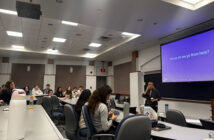
Carina Bonasera
A high school teacher once told me college would be the most selfish years of my life.
Not “best.” Not “wildest.” Not “most sleep-deprived.”
Selfish.
I’ve thought about these words a lot throughout my college experience, and I’ve come to believe they are, somehow, both accurate and untrue.
Yes, I admit, never again will we live the kind of lifestyle college permits: so much freedom, so much detachment, so much time to focus on improving ourselves in every possible way.
Because that’s the purpose of college, really — to improve. These years are designed for students to experiment with their futures, while simultaneously being removed from many real-world responsibilities. During the transition between adolescence and adulthood, we pass right through the “Lehigh bubble.”
Not having anyone to answer to is a first for many students entering college. No one dictates your actions.
You’re allowed to go anywhere you want, whenever you want. You can eat and sleep at any time of the day or night. Within the little freedoms you gain in college is a degree of autonomy that allows you to develop as an individual and discover who you are, no strings attached. Arguably the most significant lesson you learn in college is how to live with yourself.
But at the same time, we’re living a lifestyle that demands selflessness. Nothing forces you to be considerate of others like living in a room with a complete stranger.
Maybe you discover several volunteer opportunities, or you pour your heart into one big project to make a positive impact. Maybe you sacrifice some of your time and energy to join an on-campus group or a cause you’re passionate about, and work to make it succeed.
Whatever the reason, it’s clear that in many ways, the community of students we’re a part of is, by definition, selfless. Living so close to other people and being a part of things greater than ourselves teaches us to think about others’ needs, sometimes before our own. In doing so, we improve.
It’s equally OK if these years aren’t selfless. Or “the best.” Your college experience helps to shape you, but it certainly doesn’t need to dictate the rest of your life.
The average human lives for about 80 years, meaning four years of college makes up only 5 percent of a person’s life. This comes at a time when our brains are still developing and when many of us have not gotten the chance to live away from home and experience the world. It makes sense that there will be mistakes, regrets and failures.
If anything, there will be uncertainty about the future. How do you expect to plan out the rest of your life when you don’t even know what’s out there yet?
The world after college offers so many more opportunities to realize your passions. At any point in time, you have the ability to set yourself onto a new track to reach your goals. The future is something to look forward to.
At the risk of sounding cliche, your life is a journey — however consuming college feels now, it’s just a small fraction.
So.
To those who worry they’re not getting what they expected out of college. To those whose experience is more frustrating than exhilarating. To those who fear the “best years of their lives” aren’t so great after all.
A perfect college experience does not exist.
It is normal to want these years to be perfect. They are so long-awaited, but the same as any others: life experiences to enjoy, learn from and move on.
One day, maybe you’ll look back at these years and think of them in simpler terms. “Best.” “Wildest.” “Most sleep-deprived.”
But right here, right now, while we’re living them? These years are roller coasters. Chaotic, beautiful, ugly and intensely personal. Constraining them with blanket terms limits your ability to learn and grow from the gift of these “selfish” years.
Viewing these years as a gift to personal growth — I think I finally understand what my teacher meant in the first place.
—
Carina Bonasera, ’19, is a designer and data editor for The Brown and White. She can be reached at cmb219@lehigh.edu.





Comment policy
Comments posted to The Brown and White website are reviewed by a moderator before being approved. Incendiary speech or harassing language, including comments targeted at individuals, may be deemed unacceptable and not published. Spam and other soliciting will also be declined.
The Brown and White also reserves the right to not publish entirely anonymous comments.